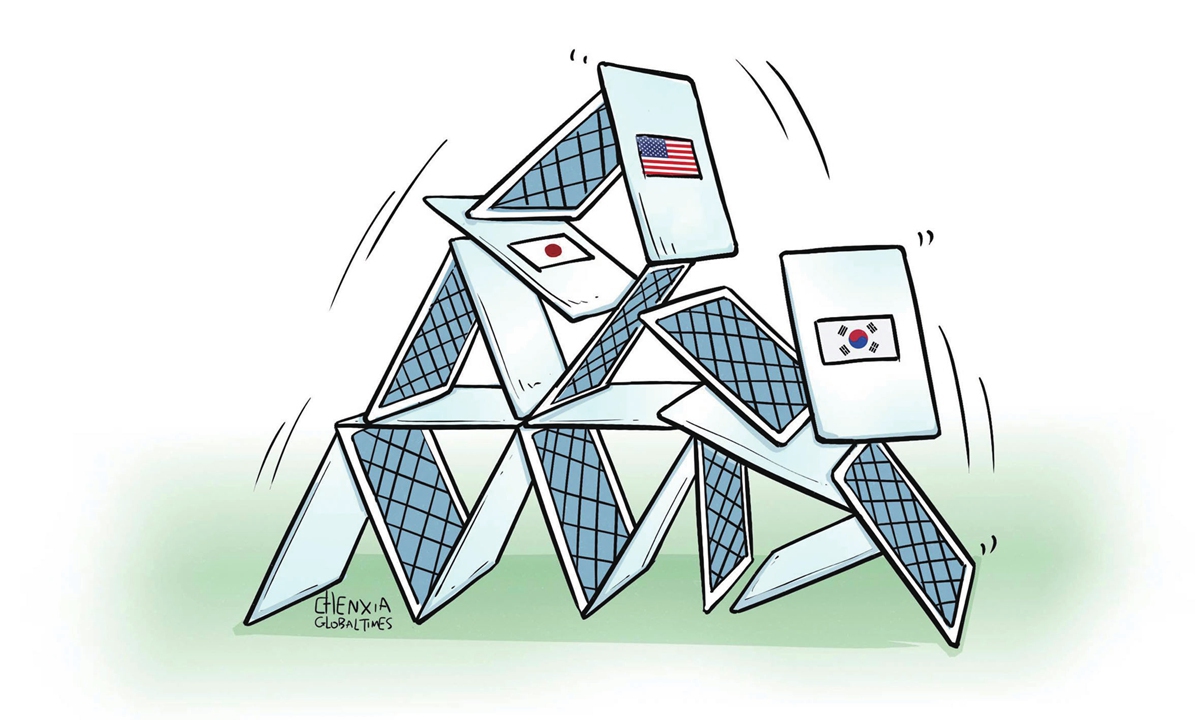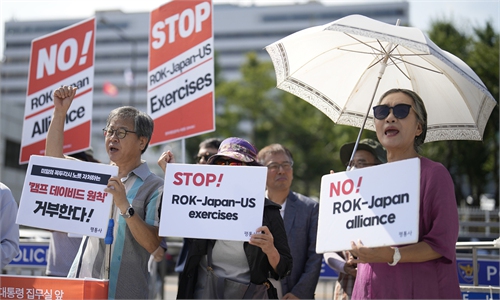
Illustration: Chen Xia/GT
The leaders of the US, Japan and South Korea issued a joint statement on Sunday marking the anniversary of their summit at Camp David and reaffirmed a pledge to jointly tackle regional challenges, Reuters quoted South Korea's presidential office as reporting on Sunday.A year ago, leaders of these three countries held their first trilateral summit at Camp David and announced the Camp David Principles and The Spirit of Camp David. The three countries pledged to inaugurate a new era of trilateral partnership, and the trilateral relationship is regarded as having started to become an alliance. The Joe Biden administration successfully facilitated the improvement of relations between Japan and South Korea, aiming to create a US-Japan-South Korea "iron triangle" in Northeast Asia to serve the strategic goals of deterring North Korea, countering China, and restraining Russia.
A year later, with the Biden administration set to end the term and the upcoming change in Japanese leadership, the reality of whether the US-Japan-South Korea alliance will become an "iron triangle" seems less aligned with the US' hopes.
Earlier this month, US Secretary of State Antony Blinken, Secretary of Defense Lloyd Austin and White House National Security Advisor Jake Sullivan jointly published an article in The Washington Post, claiming that President Biden "brought together Japan and South Korea - two countries with a difficult history - to join the US in the Camp David Trilateral Summit, spurring unprecedented defense and economic cooperation among our countries." However, behind this seemingly warm interaction, the US-Japan-South Korea cooperation faces three significant challenges.
First, domestic political factors in each of these three countries severely constrain the collaboration. In the US, as the presidential election approaches a critical phase, the potential return of Donald Trump poses a potential future that both Japan and South Korea must take into consideration. Japan and South Korea are increasingly concerned because of two completely different foreign policy approach.
For Japan, Prime Minister Fumio Kishida recently announced that he will not run in the presidential election of the ruling Liberal Democratic Party (LDP) next month. As a result, the contest for his successor is likely to lead to intense internal competition within the LDP. During time of Kishida administration, Japan has increasingly strayed from the path of peaceful development, adding to the country's fiscal burden, which has already sparked criticism and concern within Japan. Facing next year's general election, the LDP may encounter greater challenges from opposition forces, and the new Japanese prime minister will need to carefully navigate the continuation of defense and security policies.
For South Korea, although President Yoon Suk-yeol still has three years left in his term, the ruling People Power Party suffered a crushing defeat in the National Assembly elections in April this year. With the government now in the minority in the Assembly, Yoon's foreign policy will face significant constraints from progressive forces. Additionally, Yoon's relentless push to strengthen military ties with the US and Japan has heightened the risk of conflict on the Korean Peninsula, fueling domestic concerns and dissatisfaction.
Second, frictions between Tokyo and Seoul will continue to limit the depth of US-Japan-South Korea trilateral cooperation.
Since the Yoon administration took office, it has made unilateral concessions to Japan on issues such as forced labor and the dumping of Fukushima's nuclear-contaminated wastewater, in exchange for improved relations with Tokyo. Although there has been frequent high-level interaction between the two countries over the past year, disputes over historical and territorial issues continue to surface. Growing discontent is also emerging in South Korea over Yoon's pro-US policies.
Third, the spillover effects of US-Japan-South Korea cooperation are likely to backfire. As the US, Japan and South Korea continue to strengthen their security ties, Japan and South Korea may find themselves increasingly entangled in a security trap of great power competition and geopolitical confrontation.
This threatens to undermine peace, stability and cooperation in East Asia, ultimately exacerbating the security dilemmas faced by Japan and South Korea.
The author is a research fellow of the Department for Asia-Pacific Studies at the China Institute of International Studies. opinion@globaltimes.com.cn



